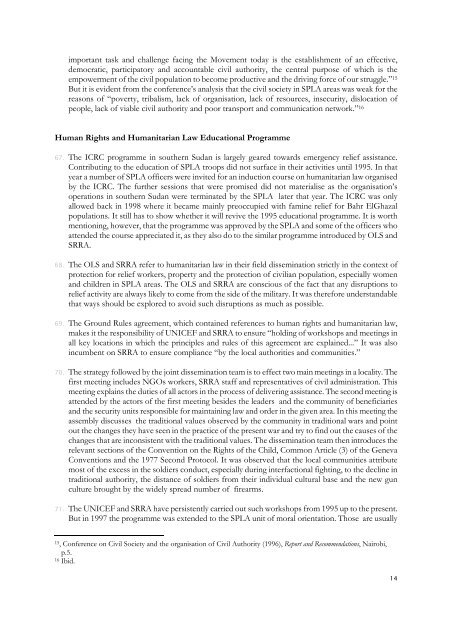105 - Sudan - Approaches to Armed Groups Kuol ... - The ICHRP
105 - Sudan - Approaches to Armed Groups Kuol ... - The ICHRP
105 - Sudan - Approaches to Armed Groups Kuol ... - The ICHRP
Create successful ePaper yourself
Turn your PDF publications into a flip-book with our unique Google optimized e-Paper software.
important task and challenge facing the Movement <strong>to</strong>day is the establishment of an effective,<br />
democratic, participa<strong>to</strong>ry and accountable civil authority, the central purpose of which is the<br />
empowerment of the civil population <strong>to</strong> become productive and the driving force of our struggle.” 15<br />
But it is evident from the conference’s analysis that the civil society in SPLA areas was weak for the<br />
reasons of “poverty, tribalism, lack of organisation, lack of resources, insecurity, dislocation of<br />
people, lack of viable civil authority and poor transport and communication network.” 16<br />
Human Rights and Humanitarian Law Educational Programme<br />
67. <strong>The</strong> ICRC programme in southern <strong>Sudan</strong> is largely geared <strong>to</strong>wards emergency relief assistance.<br />
Contributing <strong>to</strong> the education of SPLA troops did not surface in their activities until 1995. In that<br />
year a number of SPLA officers were invited for an induction course on humanitarian law organised<br />
by the ICRC. <strong>The</strong> further sessions that were promised did not materialise as the organisation’s<br />
operations in southern <strong>Sudan</strong> were terminated by the SPLA later that year. <strong>The</strong> ICRC was only<br />
allowed back in 1998 where it became mainly preoccupied with famine relief for Bahr ElGhazal<br />
populations. It still has <strong>to</strong> show whether it will revive the 1995 educational programme. It is worth<br />
mentioning, however, that the programme was approved by the SPLA and some of the officers who<br />
attended the course appreciated it, as they also do <strong>to</strong> the similar programme introduced by OLS and<br />
SRRA.<br />
68. <strong>The</strong> OLS and SRRA refer <strong>to</strong> humanitarian law in their field dissemination strictly in the context of<br />
protection for relief workers, property and the protection of civilian population, especially women<br />
and children in SPLA areas. <strong>The</strong> OLS and SRRA are conscious of the fact that any disruptions <strong>to</strong><br />
relief activity are always likely <strong>to</strong> come from the side of the military. It was therefore understandable<br />
that ways should be explored <strong>to</strong> avoid such disruptions as much as possible.<br />
69. <strong>The</strong> Ground Rules agreement, which contained references <strong>to</strong> human rights and humanitarian law,<br />
makes it the responsibility of UNICEF and SRRA <strong>to</strong> ensure “holding of workshops and meetings in<br />
all key locations in which the principles and rules of this agreement are explained...” It was also<br />
incumbent on SRRA <strong>to</strong> ensure compliance “by the local authorities and communities.”<br />
70. <strong>The</strong> strategy followed by the joint dissemination team is <strong>to</strong> effect two main meetings in a locality. <strong>The</strong><br />
first meeting includes NGOs workers, SRRA staff and representatives of civil administration. This<br />
meeting explains the duties of all ac<strong>to</strong>rs in the process of delivering assistance. <strong>The</strong> second meeting is<br />
attended by the ac<strong>to</strong>rs of the first meeting besides the leaders and the community of beneficiaries<br />
and the security units responsible for maintaining law and order in the given area. In this meeting the<br />
assembly discusses the traditional values observed by the community in traditional wars and point<br />
out the changes they have seen in the practice of the present war and try <strong>to</strong> find out the causes of the<br />
changes that are inconsistent with the traditional values. <strong>The</strong> dissemination team then introduces the<br />
relevant sections of the Convention on the Rights of the Child, Common Article (3) of the Geneva<br />
Conventions and the 1977 Second Pro<strong>to</strong>col. It was observed that the local communities attribute<br />
most of the excess in the soldiers conduct, especially during interfactional fighting, <strong>to</strong> the decline in<br />
traditional authority, the distance of soldiers from their individual cultural base and the new gun<br />
culture brought by the widely spread number of firearms.<br />
71. <strong>The</strong> UNICEF and SRRA have persistently carried out such workshops from 1995 up <strong>to</strong> the present.<br />
But in 1997 the programme was extended <strong>to</strong> the SPLA unit of moral orientation. Those are usually<br />
15 , Conference on Civil Society and the organisation of Civil Authority (1996), Report and Recommendations, Nairobi,<br />
p.5.<br />
16 Ibid.<br />
14
















